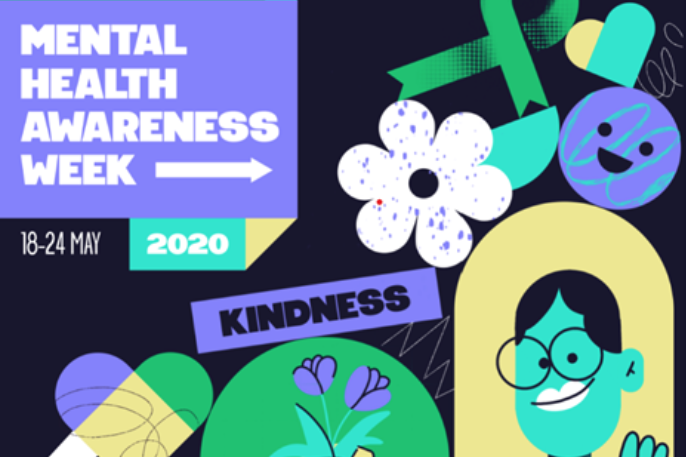Kindness
Posted on 19th May 2020 at 10:29
By Julie Wales, Relationship Counsellor
Every day I come downstairs and pass my son’s bedroom door and I hear a voice that says, “you look gorgeous today Mum”. I always say “thank you”, and he smiles back at me. He takes notice of what I am wearing and is intuitive to my feelings and understands if I am happy, sad or angry.
When I say my son is aged 22 you may say that is unusual to be complimented from someone in the family that age. He has severe learning disability which adds another dimension to the story.
That act of kindness made me feel grateful and connected to my son.
It boosted me at a time when we are having daily anxiety ups and downs during this Coronavirus lockdown.
If I asked you the last time you gave or experienced kindness, you would tell me stories of when you felt moved, protected, held, seen, loved.

The biggest act of kindness we have seen recently was in the dancing eyes of 100-year-old Captain Tom Moore as he walked his garden to raise money for the NHS and became the first person of his age to have a number one song in the charts.
I will assume most of us felt moved by Captain (now Colonel) Tom’s kindness.
The weekly Thursday 'Clap for Carers' has also felt so moving and given me a newfound perspective for the NHS and other families like mine who are caring for adult children with special needs and/or disabilities.
Research shows kindness and our mental health are deeply connected.
“Protecting our mental health is going to be central to us coping with and recovering from the coronavirus pandemic, with the psychological and social impacts likely to outlast the physical symptoms of the virus.”
(Source: Mental Health Foundation)
According to Jamie Thurston**, when kindness is shared, it grows… Unexpected kindness is a powerful thing and even the simplest of kind acts can have an astonishing effect, because when kindness is shared it ripples out into the world.
Whether giving a kind comment, being a seat vigilante or going high when others go low, we should choose kindness. After all, it is the little things that matter the most.
**Jamie Thurston is the founder of the global movement and charity called 52 Lives and the author of 'Kindness'.
What are the health benefits of kindness?
Helping others feels good
Studies have found that acts of kindness are linked to increased feelings of wellbeing. Helping others can also improve our support networks and encourage us to be more active. This, in turn, can improve our self-esteem.
There is some evidence to suggest that, when we help others, it can promote changes in the brain that are linked with happiness. The 'Good Sam' NHS Volunteer responders received over 750,000 applications from people wanting to help others in this Coronavirus pandemic.
It creates a sense of belonging and reduces isolation
Helping others is thought to be one of the ways that people create, maintain, and strengthen their social connections. For example, volunteering and helping others can help us feel a sense of belonging, make new friends and connect with our communities. Face-to-face activities such as volunteering at a food bank can also help reduce loneliness and isolation.
It helps keep things in perspective
Many people do not realise the impact a different perspective can have on their outlook on life. There is some evidence that being aware of our own acts of kindness, as well as the things we are grateful for, can increase feelings of happiness, optimism and satisfaction. Doing good may help you to have a more positive outlook about your own circumstances.
It helps to make the world a happier place – one act of kindness can often lead to more!
Acts of kindness have the potential to make the world a happier place. An act of kindness can boost feelings of confidence, being in control, happiness and optimism. They may also encourage others to repeat the good deeds they have experienced themselves – contributing to a more positive community.
The more you do for others, the more you do for yourself.
The benefits of helping others can last long after the act itself, both for those offering kindness, and for those who benefit. This, in turn, can improve our self-esteem.
Be kind to yourself.
Prioritise some “me” time, so you can relax and reflect on how you are feeling and how your day or week has been so far.
Turn off from your social media channels for a day, or even a week.
Treat yourself to something small, such as buying or planting some flowers.
Do something you enjoy, like listening to a favourite song or dancing in your kitchen.
Spend some time in nature, which is good for our mental health.
Look at ways of boosting your self-esteem, especially for young people, e.g. ask yourself these questions:
1. My friends think I am awesome because…...
2. My classmates say I am great at…...
3. I feel happy when I…...
4. Something that I am proud of…...
5. I make my family happy when I…...
Some creative things to try and be kind to yourself include drawing, writing in a journal, singing, creating coping statements and putting them in a glass jar to empty out when you're having a low mood day, etc.
If you feel you would benefit from improving your self-esteem, mental health and wellbeing, then talking about it really does help. Please contact Julie on 07412 651 894.
Share this post:






